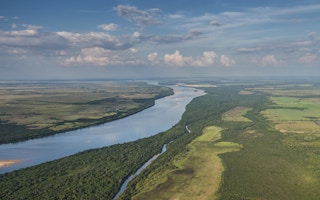The world’s leading forest monitoring platform may soon help predict deforestation before it occurs, potentially enabling authorities to prevent it altogether.
Under a partnership announced last week, Silicon Valley start up Orbital Insight will use high resolution satellite imagery provided by Global Forest Watch — a platform developed by World Resources Institute (WRI) — to design algorithms to anticipate where deforestation is likely to occur in the future.
The predictive modeling will look for patterns, like road-building in remote areas and canopy thinning from selective logging, that could forecast eventual clearing.
“Satellites already enable us to monitor many stages of commodities supply chains, from land use change and production to the transportation of raw materials,” said Aaron Steele, WRI’s Chief Technology Officer, in a statement.
“Orbital Insight’s algorithms will help us analyze and understand these complex networks to the point where we could forecast deforestation risk based on indicators like the number of logging trucks seen in an area.”
The idea to use satellite data to predict deforestation is not new — Imazon, a Brazilian NGO, has been using the approach for years. But the new partnership, which will take advantage of Global Forest Watch’s massive data trove, could dramatically scale the approach while applying more advanced algorithms developed by Orbital Insight, which specializes in a form of artificial intelligence called “deep learning”.
“We currently know a lot about forest clearing that has happened in the past, but soon we will have the power to look ahead and identify the forest areas at greatest risk,” explained Steele. “This partnership makes cutting-edge technology available to everyone and demonstrates how deep learning can have clear benefits for people and the planet.”
Orbital Insight was founded by James Crawford, a former engineer at NASA and Google, in 2013. The “big data” company is backed by several prominent investors, including Google’s venture capital arm.










